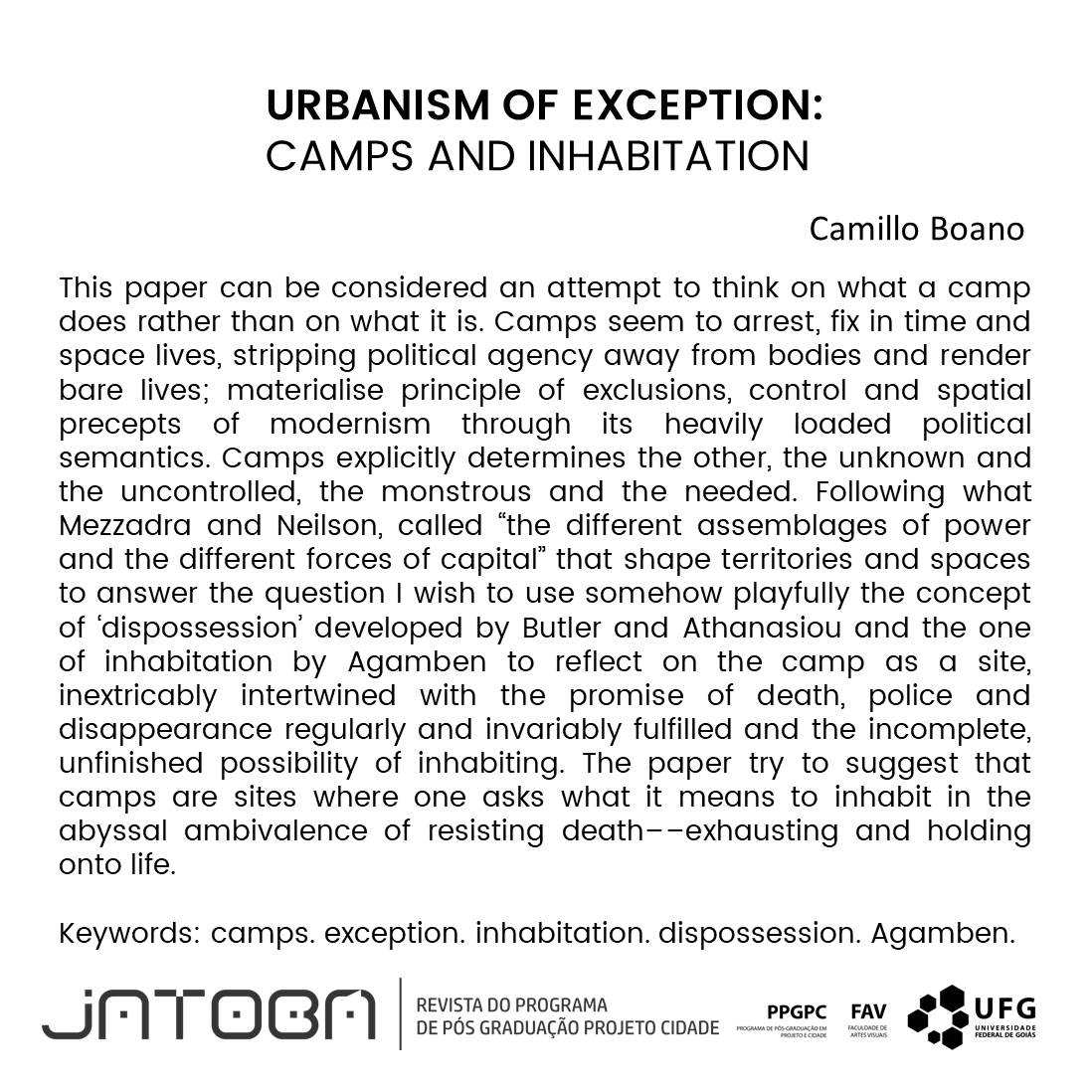Urbanism of exception: camps and inhabitation
Camps and inhabitation
DOI:
https://doi.org/10.54686/revjat.v3i.68984Keywords:
Camp, exception, architecture, inhabitationAbstract
Writing on camps is dangerous as they are never constrained to the architectural scale and form, we might firstly perceive them. If examined as singular objects, even in their multiple diverse morphological aspects and their contested historiography, they seem incapable of mobilizing architectural and spatial reflection beside an aesthetic of precarity, the makeshift of resistance or the violent power of control, surveillance, exclusion, and death. But when imbricated with infrastructures, territories, materials, border regimes, migration policies, activism, and network of solidarity they become active part in a larger reality-making apparatus enhancing different temporal and spatial articulations without recomposition. in this short contribution I want to reflect on what I consider a central tension and ambivalence of the camp in political theory and architectural and urban thinking: the tension between the camp and the possibility (or impossibility) of inhabitation.
Downloads
References
ABOURAHME, N., The Camp. Comparative Studies of South Asia, Africa and the Middle East, v.40, n.1, p. 35-42, 2020.
AGAMBEN, G. Homo Sacer: Sovereign Power and Bare Life. Translated by Daniel Heller-Roazen. Stanford: Stanford University Press, 1998.
AGAMBEN, G. Means Without End: Notes on Politics. Translated by Vincenzo Binetti, Cesare Cesarino, Minneapolis: University of Minnesota Press, 2000.
ABOURAHME, N., The Camp. Comparative Studies of South Asia, Africa and the Middle East, v.40, n.1, p. 35-42, 2020.
AGAMBEN, G. Homo Sacer: Sovereign Power and Bare Life. Translated by Daniel Heller-Roazen. Stanford: Stanford University Press, 1998.
AGAMBEN, G. Means Without End: Notes on Politics. Translated by Vincenzo Binetti, Cesare Cesarino, Minneapolis: University of Minnesota Press, 2000.
AGAMBEN, G. State of Exception. Translated by Kevin Attell. Chicago: Chicago University Press, 2005.
AGAMBEN, G. Nudities. Stanford: Stanford University Press, 2010.
AGAMBEN, G. Costruire e Abitare. Apertura Anno Accademico 2018/19 Univerista’ di Roma. Available online: https://www.youtube.com/watch?v=Q_LYyYKLb_8 (accessed on 15 March 2019).
AGAMBEN, G. Introduzione, in ATTILI, G. Civita. Senza aggettivi e senza altre specificazioni. Macerata: Quodlibet, 2021, p.11-12.
AGIER, M. Aux Bords du monde, les réfugiés. Paris: Flammarion, 2002a.
AGIER, M. Managing the Undesirables: Refugee Camps and the Humanitarian Government. Cambridge: Polity Press, 2011.
Agier, M. Between war and city Towards an urban anthropology of refugee camps. Ethnographies, v. 3, n. 3, p. 317–341, 2002b.
Agier, M. Camps, Encampments, and Occupations: From the Heterotopia to the Urban Subject. Ethnos, v.84, p. 14-26, 2019
Aradau C.; Tazzioli M. Biopolitics Multiple: Migration, Extraction Subtraction. Millennium. 2020;48(2):198-220
ATTILI, G. Civita. Senza aggettivi e senza altre specificazioni. Macerata: Quodlibet, 2021.
BIEHL, J.; LOCKE, P. Unfinished: The Anthropology of Becoming. Dorham and London: Duke University Press, 2017.
BOANO, C. The Ethics of Potential Urbanism. Critical Encounters between Giorgio Agamben and Architecture. London: Routledge, 2017.
Boano, C.; Martén, R. Agamben’s urbanism of exception: Jerusalem’s border mechanics and biopolitical strongholds. Cities v.34, p. 6–17, 2013.
Boano, C. From Exclusion to Inhabitation: Response to Gray Benjamin. Citizenship as Barrier and Opportunity for Ancient Greek and Modern Refugees. Humanities v.8 n. 125, p. 1-8, 2019.
Boano, C. La politica del tocco. Il progetto oltre la periferia della pelle. Territorio, forthcoming.
Boano, C. Forms of (Collective) Life: The Ontoethics of Inhabitation, Architecture and Culture, 2020, DOI: 10.1080/20507828.2020.1802199
BOANO, C.; ASTOLFO, G. Inhabitation as more-then-dwelling. Notes for a renewed grammar. International Journal of Housing Policy, v. 20, n. 4, p. 555-577, 2020.
BOSCO ODOLOMA O. Refugee Coloniality: An Afrocentric Analysis of Prolonged Encampment in Kenya, PhD Thesis, Flinders University, 2021. Available at: https://www.researchgate.net/profile/Bosco-Opi-2/publication/350387738_Refugee_Coloniality_An_Afrocentric_Analysis_of_Prolonged_Encampment_in_Kenya/links/605d2448a6fdccbfea084b81/Refugee-Coloniality-An-Afrocentric-Analysis-of-Prolonged-Encampment-in-Kenya.pdf
BUTLER, J.; ATHANASIOU, A. Dispossessions: The performative in the political. Cambridge: Polity Press, 2013
De Genova, N., Tazzioli, M, et all. Minor keywords of political theory: Migration as a critical standpoint A collaborative project of collective writing. Environment and Planning C: Politics and Space. https://doi.org/10.1177/2399654420988563, 2021.
Dias, A. Aux marges de la ville et de l’État. Camps palestiniens au Liban et favelas cariocas, Anthropologica, v.57, n.1, p. 265, 2019.
DE GENOVA, N. The Borders of “Europe”: Autonomy of Migration, Tactics of Bordering. Durham, NC: Duke University Press, 2017.
Ek, R. Giorgio Agamben and the Spatialities of the Camp : An Introduction. The Swedish Society for Anthropology and Geography, v.88, n.B(4), p. 363–386, 2006.
HAILEY, C. Camps. A guide to 21st Century Space. Massachusset: MIT Press, 2009
PETTI, A., HILAL, S. and PORCARO, S. “Asymmetries”. Waiting - A Project in Conversation, edited by Shahram Khosravi, Bielefeld: transcript-Verlag, 2021, pp. 105-112. https://doi.org/10.14361/9783839454589-012
HEIDEGGER, M. Building, Dwelling, Thinking. From Poetry, Language, Thought. Translated by Albert Hofstadter. New York: Harper Colophon Books, 1954.
HYNDMAN, J. Managing. Displacement : Refugees and the Politics of Humanitarianism. Minneapolis: University of Minnesota Press, 2000.
KATZ, I., MARTIN, D., MINCA, C. Camps Revisited: Multifaceted Spatialities of a Modern Political Technology. London: Rowman & Littlefield, 2018.
Katz, I. From spaces of thanatopolitics to spaces of natality – A commentary on “Geographies of the camp”, Political Geography, v. 49, pp. 84–86, 2015.
Katz, I.The Common Camp: Temporary Settlements as a Spatio-political Instrument in Israel-Palestine, The Journal of Architecture, v. 22, n. 1, p. 54-103, 2017.
MANNING, E. For a Pragmatic of the Useless. Durham: Duke University Press, 2020
Maqusi, S. Space of Refuge’: Negotiating Space with Refugees Inside the Palestinian Camp. Humanities, v.6, 2017
Martin, D. From spaces of exception to “campscapes”: Palestinian refugee camps and informal settlements in Beirut, Political Geography, v. 44, p. 9–18, 2015.
Martin, D., Minca, C., Katz, I. Rethinking the camp: On spatial technologies of power and resistance. Progress in Human Geography. doi: 10.1177/0309132519856702, 2019.
Minca, C. The Return of the Camp. Progress in Human Geography, v.29, p. 405–412, 2005
Minca, C., Rijke, A., Pallister-Wilkins, P. Rethinking the biopolitical: Borders, refugees, mobilities, Environment and Planning C: Politics and Space. doi:10.1177/2399654420981389, 2021.
McConnachie, K. Camps of Containment: A Genealogy of the Refugee Camp. Humanity: An International Journal of Human Rights, Humanitarianism, and Development, v.7, n.3, p. 397–412, 2016
MEZZADRA S.; NEILSON, B. Border as Method, or the Multiplication of Labor. Durham, NC: Duke University Press, 2013.
Mountz, A. The enforcement archipelago: Detention, haunting, and asylum on islands. Political Geography, v.30, n.3, p. 118–128, 2011.
NOBRE, L.; NAKANO, A.K. On the Slab, Our Architecture under Construction. Humanities, v. 6, p. 62, 2017.
Owens, P. Reclaiming “bare life”?: Against Agamben on refugees. International Relations, v. 23, n.4, p. 567–582, 2009.
PEREGO, E.; SCOPACASA, R. The Agency of the Displaced? Roman Expansion, Environmental Forces, and the Occupation of Marginal Landscapes in Ancient Italy. Humanities 7: 116., 2018
PICOZZA, F. Dubliners: Unthinking displacement, illegality and refugeeness within Europe’s geographies of asylum. In: De Genova N (ed.) The Borders of “Europe”. Autonomy of Migration Bordering Tactics. Durham, NC: Duke University Press, pp. 233–254, 2017.
Petti, A. Refugee Heritage. Part III Justification for Inscription. Humanities v.6, p. 66, 2017
Prem Kumar, R.; Grundy-Warr, C. The irregular migrant as Homo sacer: Migration and detention in Australia, Malaysia, and Thailand’, International Migration, v. 42, n.1, p. 33–64, 2004.
ROY, A. and N. ALSAYYAD. Urban informality: transnational perspectives from the Middle East, Latin America, and South Asia. Lexington Books, Lanham.2004.
Sanyal, R. Refugees and the City: An Urban Discussion. Geography Compass v.6, p. 633–644, 2012.
Sanyal, R. Urbanizing Refuge: Interrogating Spaces of Displacement. International Journal of Urban and Regional Research, v.38, p. 558–572, 2014.
Ramadan, A. Spatialising the refugee Camp. Transactions of the Institute of British Geographers v.38, p. 65–77, 2013.
Ramadan, A., Fregonese, S. Hybrid Sovereignty and the State of Exception in the Palestinian Refugee Camps in Lebanon. Annals of the American Association of Geographers, v. 107, n.4, p. 949–963, 2017.
Ribeiro, B.; Oelze, F.; Lopes, O. A Narrative of Resistance: A Brief History of the Dandara Community, Brazil. Humanities v.6, p. 70, 2017.
Rgiel, K. Bordering solidarities: Migrant activism and the politics of movement and camps at Calais. Citizenship Studies, v.15, n.1, p. 1–19, 2011.
Rygiel, K. Politicizing camps: forging transgressive citizenships in and through transit, Citizenship Studies, v.16, n. 5-6, p. 807-825, 2012.
SALZANI, C. From Benjamin Bloßen Leben to Agamben Nuda Vita, in Towards the Critique of Violence: Walter Benjamin and Giorgio Agamben. Edited by Brendan Moran and Carlo Salzani. London: Bloomsbury, pp. 107–23, 2015.
Sigona, N. Campzenship: reimagining the camp as a social and political space, Citizenship Studies, v.19, n.1, p. 1-15, 2015.
TAZZIOLI, M. Spaces of governmentality. Autonomous Migration and the Arab Uprisings. London & New York: Rowman & Littlefield International, 2015.
TAZZIOLI, M. The Making of Migration: The Biopolitics of Mobility at Europe’s Borders. London: Sage, 2019.
Tazzioli, M. Garelli, G. Containment beyond detention: The hotspot system and disrupted migration movements across Europe. EPD: Society and Space, v. 38, n. 6, p.1009–1027, 2020.
Tuastad, D. “State of exception” or “state in exile”? The fallacy of appropriating Agamben on Palestinian refugee camps. Third World Quarterly, v. 38, n. 9, p. 2159–2170, 2017.
TURNER, S. Suspended spaces-contesting sovereignties in a refugee camp. In: Sovereign Bodies: Citizens, Migrants and States in the Postcolonial World. Edited by Thomas Blom Hansen and Finn Seputet. Princeton: Princeton University Press, p. 312–331, 2005.
QASMIYEH, Y.M. Vis-à-vis or a camp, 2016. Accessed 12 March 2021 at https://refugeehosts.org/2016/09/30/writing-the-camp/
QASMIYEH, Y.M. The camp is time. 2017. Accessed 13 March 2021, at https://refugeehosts.org/2017/01/15/the-camp-is-time/
WEHELIYE, A.G., Habeas Viscus: Racializing Assemblages, Biopolitics, and Black Feminist Theories of the Human. Durham: Duke University Press, 2014.
WEIMA, Y.; HYNDMAN, J. Managing Displacement: Negotiating transnationalism. Encampment and return. In: Handbook on Critical Geographies of Migration. Edited by Katharyne Mitchell, Reece Jones and Jennifer L. Fluri. Cheltenham: Edward Elgar Publishing, p. 30–43, 2019

Downloads
Published
How to Cite
Issue
Section
License
Copyright (c) 2021 Revista Jatobá

This work is licensed under a Creative Commons Attribution 4.0 International License.
- Autores mantém os direitos autorais e concedem à revista o direito de primeira publicação, com o trabalho simultaneamente licenciado sob a Licença Creative Commons Attribution 4.0 que permite o compartilhamento do trabalho com reconhecimento da autoria e publicação inicial nesta revista.
- Autores têm autorização para assumir contratos adicionais separadamente, para distribuição não-exclusiva da versão do trabalho publicada nesta revista (ex.: publicar em repositório institucional ou como capítulo de livro), com reconhecimento de autoria e publicação inicial nesta revista.
- Autores têm permissão para publicar e distribuir seu trabalho online (ex.: em repositórios institucionais ou na sua página pessoal) após a publicação inicial nesta revista, já que isso pode gerar alterações produtivas, bem como aumentar o impacto e a citação do trabalho publicado (Veja O Efeito do Acesso Livre).
- Foram feitos todos os esforços para identificar e creditar os detentores de direitos sobre as imagens publicadas. Se tem direitos sobre alguma destas imagens e não foi corretamente identificado, por favor, entre em contato com a revista Jatobá e publicaremos a correção num dos próximos números.














